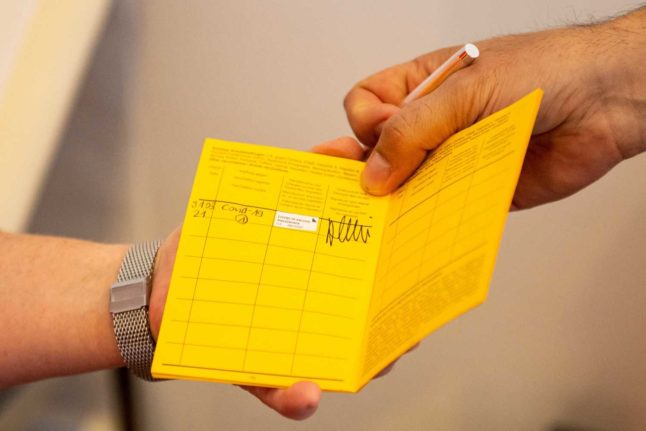In March, Switzerland announced it is working on a coronavirus immunity certificate which allows people to have certain privileges, from visiting restaurants to attending events and travelling.
However, as the certificate – known as yet as a ‘green pass’ – is not expected until the summer, how do you prove you have been vaccinated?
Here’s what you need to know.
What proof do you get once you are vaccinated in Switzerland?
Once you receive your doses, you will be given a signed vaccination certificate, which specifies, among other things, which vaccine was administered — the trade name, manufacturer, and batch number.
You will receive this document directly from the vaccination centre. More information is available here.
This information will be entered into the myCOVIDvac electronic vaccination record. But this step is voluntary and will be done only if you give your consent.
If you choose not to have a digital document, you can have the vaccination recorded in in paper format.
Why would you opt to have your information recorded electronically?
There are numerous advantages to having your vaccination record stores electronically.
Important information about your COVID-19 vaccination (name of vaccine received, dates of vaccinations, etc.) is stored securely in Switzerland.
You alone determine who may access your protected data.
Your e-vaccination record cannot be lost.
The e-vaccination record can be accessed online at any time and anywhere in the world if necessary.
You will be automatically notified at the time of the second vaccine dose – and also if a later booster is needed.
You can share the information with your doctors and pharmacists if you wish.
Should an international COVID-19 vaccination certificate be required at a later date, the stored information would serve as the basis for an international vaccination certificate.



 Please whitelist us to continue reading.
Please whitelist us to continue reading.
When is it expected that the myCOVIDvac website will be working?
You mentioned after 2 vaccinations you receive I signed certificate. Mine has the name of clinic, dates, dosage etc but they said they don’t sign it nor put the seal of the clinic. Any clarification?
Also your list of people not required to pay does not include people like my wife who is a retired foreign swiss resident Permit C but does not have a Swiss health insurance. A recent Federal law stated she is covered for the vaccines but my canton Valais has no information on this. Advice also appreciated.
I am very concerned about how this COVID thing is being managed now that I find out that the Swiss Medics is receiving money from the GAVI Alliance property of Bill and Melinda Gates who also have shares in 7 companies that produces vaccines, What about the gift of GOD to his Creation what is called IMMUNE SYSTEM?